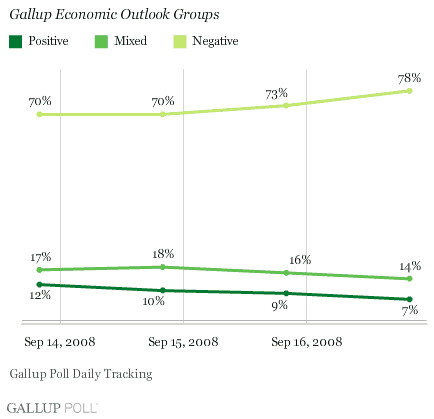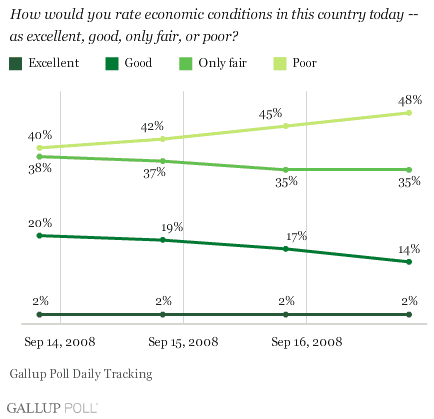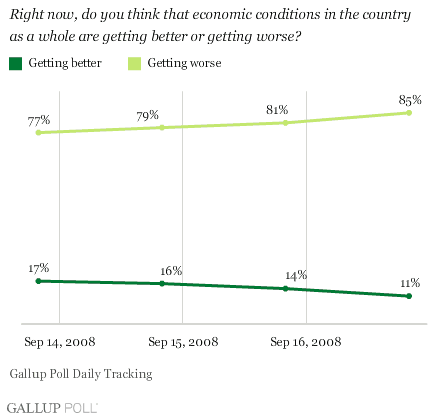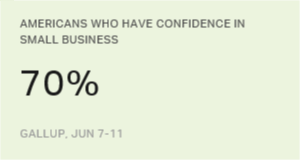PRINCETON, NJ -- The latest Gallup Poll Daily tracking update on consumer confidence finds the public's economic outlook going from bad to worse quickly amid the upheaval on Wall Street -- 78% of Americans now have a negative view of the economy, up eight percentage points in just two days.

These results are based on interviews conducted Monday through Wednesday, Sept. 15-17, and reflect the impact of the collapse or near collapse of venerable investment firms Lehman Brothers and Merrill Lynch, and insurance giant AIG in recent days on consumer confidence. Lehman Brothers filed for bankruptcy, Merrill Lynch was sold to Bank of America, and the federal government intervened to prevent AIG from failing.
Despite this week's increasing negativity, economic attitudes have been more pessimistic at other times this year than they are at the moment. The percentage classified as having a negative outlook has risen as high as 83% in late June and again in early July. As gas prices began to drop in August, Americans became less negative about the economy -- though they still remained largely pessimistic -- with the percent holding a negative view of the economy falling as low as 69%. That's roughly where it was at the start of this week (70%).
If the current daily trends continue, which show growing pessimism on Tuesday and Wednesday, the percentage of Americans with a negative economic outlook will continue to increase in coming days.
Gallup classifies Americans as having a negative outlook if they rate current conditions as "only fair" or "poor" and say the economy is "getting worse" or staying the same.
In the latest update, 48% issued the most negative assessment of current conditions -- describing them as "poor" -- compared to 40% in Monday's report.

Meanwhile, 85% say the economy is getting worse, an 8-point increase in negative perceptions from three days ago.

The worst assessments on these measures for this year are 52% poor and 90% getting worse, which are among the worst Gallup has measured in any polling it has done on the economy since the early 1990s. -- Jeff Jones
Survey Methods
Results are based on telephone interviews with 1,528 national adults, aged 18 and older, conducted Sept. 15-17, 2008, as part of Gallup's daily tracking survey. For results based on the total sample of national adults, one can say with 95% confidence that the maximum margin of sampling error is ±3 percentage points.
Interviews are conducted with respondents on land-line telephones (for respondents with a land-line telephone) and cellular phones (for respondents who are cell-phone only).
In addition to sampling error, question wording and practical difficulties in conducting surveys can introduce error or bias into the findings of public opinion polls.
To provide feedback or suggestions about how to improve Gallup.com, please e-mail feedback@gallup.com.
